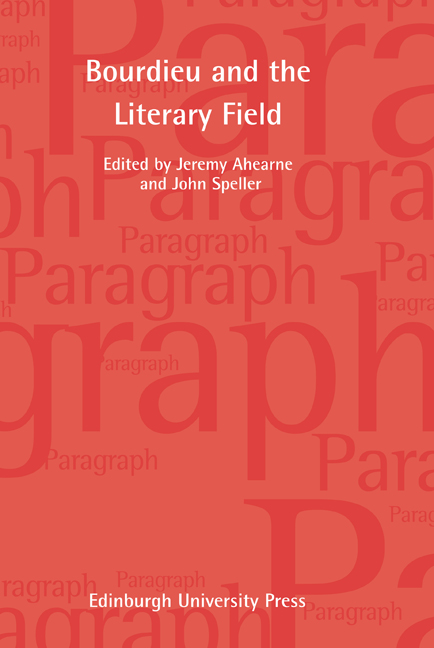Book contents
- Frontmatter
- Contents
- Introduction: Bourdieu and the Literary Field
- How Field Theory Can Contribute to Knowledge of World Literary Space
- Autonomy Revisited: The Question of Mediations and its Methodological Implications
- The Literary Field and the Field of Power: The Case of Modern China
- Between Repression and Anamnesis: Pierre Bourdieu and the Vicissitudes of Literary Form
- Reading and Reflexivity: Bourdieu’s Faulkner
- Fields and Fragments: Bourdieu, Pascal and the Teachings of Literature
- On an Enigmatic Text by Pierre Bourdieu
- Apollinaire, Autumn Ill
- Notes on Contributors
The Literary Field and the Field of Power: The Case of Modern China
Published online by Cambridge University Press: 17 September 2020
- Frontmatter
- Contents
- Introduction: Bourdieu and the Literary Field
- How Field Theory Can Contribute to Knowledge of World Literary Space
- Autonomy Revisited: The Question of Mediations and its Methodological Implications
- The Literary Field and the Field of Power: The Case of Modern China
- Between Repression and Anamnesis: Pierre Bourdieu and the Vicissitudes of Literary Form
- Reading and Reflexivity: Bourdieu’s Faulkner
- Fields and Fragments: Bourdieu, Pascal and the Teachings of Literature
- On an Enigmatic Text by Pierre Bourdieu
- Apollinaire, Autumn Ill
- Notes on Contributors
Summary
Abstract:
This article discusses ways in which Pierre Bourdieu's literary sociology has inspired scholarship on modern Chinese literature, helping it to move away from overly politicized paradigms of literary historiography. The article also asks the question to what extent the use of a Bourdieusian model has resulted in an overemphasis on the ‘relative autonomy’ of a literary field that, at various times during the twentieth century, has been operating under conditions of strong direct state interference. After giving a general overview of the use of Bourdieu's ideas in the study of modern Chinese literature, the article focuses especially on the question of autonomy and the state, arguing for the study of state censors as specific ‘agents’ within the literary field. The article ends with a brief discussion of the rapid rise of online literary communities in China, their practices and their relation to state institutions.
Keywords: Pierre Bourdieu, China, literary field, field of power, socialism, censorship, internet literature
Introduction
In my only ever direct communication with the late Pierre Bourdieu, via email in 1996, he expressed surprise that his ideas about literature could be applied to such an ‘alien’ field as the study of Chinese literature. Sure enough, for scholars who have debated the use of Bourdieu's field model in understanding literary production in non- Western societies, the question of ‘applicability’ has often loomed large. It is not always clear, however, to what extent those sceptical of Bourdieu's framework are genuinely concerned about its cross-cultural potential and to what extent their critique is based on a general distaste for the sociological method. Consider, for instance, the comment cited below, from a scholar of modern Chinese literature expressing reservations about Bourdieu's approach:
Bourdieu's theory provides an interesting dimension through which to consider the emergence of revolutionary literature, involving an analysis of the historical development of the available possibilities in literature within the broader field of power on the one hand and an account of the individual and class habitus that engenders strategies of competition on the other. However, Bourdieu's Francocentric observation of the literary field that is based on cultural capital or symbolic capital cannot fully explain the utopian desire, the nationalist implication, the semicolonial sentiment, or an individual's sensuous and bodily experience that are implicated in the movement of ‘revolutionary literature’.
- Type
- Chapter
- Information
- Bourdieu and the Literary FieldParagraph Volume 35, Number 1, pp. 49 - 65Publisher: Edinburgh University PressPrint publication year: 2020



